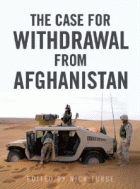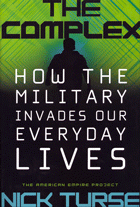[Note for TomDispatch Readers: I never do this, but I should -- and far more often, too! I want to take a moment to thank every TomDispatch reader who's become a “recurring donor” to this website -- who, that is, has decided to give a set sum monthly, quarterly, or yearly to TD. I see your names whenever the donations come in, but never get to thank you. Consider this my collective bow of appreciation! You truly do mean the world to TomDispatch (and to me). In reality, there’s just no way to put my gratitude into words. You’ve kept this site going. So, thank you! And if there are any of you who planned on becoming recurring donors but haven’t yet, just go to our donation page. Tom]
The 47-Minute Presidency
The Reign of King Toot
By Tom Engelhardt
Recently, I did something rare in my life. Over a long weekend, I took a few days away and almost uniquely -- I might even say miraculously -- never saw Donald Trump’s face, since I didn’t watch TV and barely checked the news. They were admittedly terrible days in which 50 people were slaughtered in New Zealand. Meanwhile, the president indulged in another mad round of tweeting, managing in my absence to lash out at everything and everyone in sight (or even beyond the grave) from John McCain, Saturday Night Live, and the Mueller “witch hunt” to assorted Democrats and even Fox News for suspending host Jeanine Pirro’s show. In his version of the ultimate insult, he compared Fox to CNN. And I was blissfully ignorant of it all, which left me time to finally give a little thought to... Donald Trump.
And when I returned, on an impulse, I conjured up the initial Trumpian moment of our recent lives. I’m aware, of course, that The Donald first considered running for president in the Neolithic age of 1987. He tried to register and trademark “Make America Great Again,” a version of an old Reagan campaign slogan, only days after Mitt Romney lost the 2012 presidential election to a charismatic, young, black senator. He then rode that new president’s “birth certificate” into the post-Apprentice public spotlight amid a growing wave of racism in a country founded on slavery that has never truly grappled with that fact.
Still, the 47 minutes and eight seconds that I was thinking about took place more recently. On June 16, 2015, Donald and Melania Trump stepped onto a Trump Tower escalator and rode it down to the pounding beat of Neil Young’s “Rockin’ in the Free World” (a song the singer would soon demand, without success, that the presidential hopeful not use). A minute and a half later, they arrived in the Trump Tower lobby. There, a clapping Ivanka greeted her father with a kiss on each cheek -- the first signal of the corporatist, family-style presidency to come. Then, The Donald stepped to the microphone and promptly launched his run into fake-news history.
Sometimes, the only way to go forward, or at least know where you are in the present, is to go back. Yes, Donald Trump garnered much news with his announcement that day and was already visibly having the time of his life, but no one in or out of the media then thought he had a shot at being president. Even he was only burnishing his brand. As Michael Wolff reported in his book Fire and Fury, even on election night 2016, almost a year and a half later, with the possible exception of Steve Bannon, no one in the Trump camp, including The Donald, had the slightest expectation of his winning the presidency. All of them were just burnishing their future brands.
And yet, in the spring of 2019, those largely forgotten 47 minutes are worth another look because, in retrospect, they provide such a vivid window into what was to come, what’s still coming. They offer the future president not naked at last, but naked at first, and so represent an episode of revelatory wonder (and, had anyone then believed that he might actually win the presidency, of revelatory dread as well).
[Note for TomDispatch Readers: Parts of today’s chilling piece by Rebecca Gordon on the Trump administration’s wholesale rejection of the International Criminal Court were adapted from her (sadly) all-too-relevant book, American Nuremberg: The U.S. Officials Who Should Stand Trial for Post-9/11 War Crimes. Should you want to get your hands on a copy, signed and personalized, you can do so by going to our donation page and giving $100 to TD ($125 if you live outside the U.S.). And while you’re at it, you'll lend us a helping hand, which is always truly appreciated! Tom]
If a tree falls in a forest and no one is around to hear it, does it make a sound?
The advent of sound recording deep-sixed this age-old thought experiment and offered a definitive answer: Yes!
I’ve got another one for you, though: if you water-torture someone at a secure military compound and no one is around to see it, is it a war crime?
Tricky, right?
Well, what if someone does see it? And what if you admit to it -- and to a criminal investigator, no less? And what if you add that you also used electrical torture, too? Is that, in fact, a war crime?
More cut and dried, right?
And what if criminal investigators identified 28 other members of your military unit as having beaten prisoners, tortured them with electric shocks, and water-boarded them? And what if 15 of them actually admitted to those acts? Is that, I ask you, a war crime?
Some people are charged with, tried, or even convicted, of torture: Nazis, Ford Motor Company executives in Argentina, and high-ranking Guatemalan military officers, for example. But others aren’t.
Years ago, when I investigated the particular set of crimes mentioned above that were carried out by U.S. military intelligence personnel in Vietnam, I found that only three of the soldiers involved were even punished. And by punished, I mean that the three received fines or reductions in rank. None served any prison time.
One of the admitted torturers I spoke with was still unrepentant. He explained to me that, were he placed in the same situation again, he would do exactly the same things. And why wouldn’t he? You don’t find Americans in the dock at the International Criminal Court (ICC). But if the Trump administration has its way, as TomDispatch regular Rebecca Gordon reports so strikingly today, the ICC’s judges and prosecutors might be the ones who find themselves charged and -- though it's a stretch of the imagination -- behind bars. And given what we know about the U.S. prison system, that might also mean finding themselves at risk of torture.
“We were... nothing short of criminals in the eyes of everyone except our parents and close friends,” the admitted torturer told me, while complaining about the postwar treatment of Vietnam veterans. But he was never charged, let alone tried or convicted for the torture he admitted to meting out. Will ICC officials one day be convicted in American courts of meting out justice? For the moment, the jury is still out. Nick Turse
How to Make Yourself an Exception to the Rule of Law
John Bolton and Mike Pompeo Defy the International Criminal Court
By Rebecca GordonEvents just fly by in the ever-accelerating rush of Trump Time, so it’s easy enough to miss important ones in the chaos. Paul Manafort is sentenced twice and indicted a third time! Whoosh! Gone! The Senate agrees with the House that the United States should stop supporting Saudi Arabia in Yemen (and Mitch McConnell calls this attempt to extricate the country from cooperation in further war crimes “inappropriate and counterproductive”)! Whoosh! Gone! Twelve Republican senators cross party lines to overturn Trump’s declaration of a national emergency on the U.S.-Mexico border, followed by the president’s veto! Whoosh! Gone! Delegates to the March 2019 U.N. Environment Assembly meeting agree to a non-binding but important resolution drastically reducing the production of single-use plastic. The United States delegation, however, succeeds in watering down the final language lest it “endorse the approach being taken in other countries, which is different than our own”! Once again, the rest of the world is briefly reminded of the curse of American exceptionalism and then, whoosh! Gone!
Who now remembers the classic 1956 sci-fi movie Invasion of the Body Snatchers? In it, alien spores drop to earth in... yes, California (undoubtedly not too far from the Mexican border)... and develop into seed pods that can replicate and then take over any nearby sleeping human being. What a nightmarish film. It certainly scared the hell out of 12-year-old me! What a terrifying, fantastical vision of alien “invasion” and “invaders,” terms that are now as comfortable for President Trump and his base as they were for the murderous Brenton Tarrant in New Zealand recently. In fact, both men used similar terms on the same day. Tarrant posted a 74-page white-nationalist screed in which he swore that his killing spree was “to show the invaders that our lands will never be their lands.” The president, vetoing a Congressional attempt to block his national emergency to build his “great, great wall,” claimed that “people hate the word ‘invasion,’ but that’s what it is.”
Of course, Trump, who has long wanted to militarize the U.S.-Mexico border and raised the possibility of sending troops there in the first days of his presidency (finally doing so last year), has regularly claimed that the citizens of this country face a literal “invasion” of aliens. As he tweeted last October, “This is an invasion of our Country and our Military is waiting for you!" He was then focused on one of the “caravans” of several thousand refugees from various devastated Central American countries who wanted to reach the border safely to present themselves as candidates for asylum here. Significantly -- as TomDispatch regular and border expert William deBuys points out today -- the cast of “invaders” crossing that border in recent years, like those filling the caravans, has increasingly been made up of parents (often mothers) and children.
In New Zealand, Tarrant’s response to such “invaders” -- Muslims, not Mexicans or Central Americans -- was to slaughter 50 people, the youngest a three year old, the oldest 78. In the U.S., it’s been other kinds of cruelty, but in both cases, the perpetrators are living in a distinctly sci-fi world in which modern versions of those body snatchers are the norm and, to take but one example, El Paso, Texas, was essentially the crime capital of the United States until it got its border wall. (It wasn’t faintly, but no matter.) So believe me, it’s a relief to leave the Trumpian body-snatching version of the border behind for a moment as deBuys explores what the realities of those borderlands actually are. Tom
How to Make a Difficult Situation Awful
Or Why Donald Trump’s Great Wall Is Viagra for Him, But a Border Disaster
By William deBuysBorders are cruel. I know this because I’ve been studying the U.S.-Mexico border for more than 40 years. It features prominently in two of my books, written in different decades. It keeps pulling me back. Every time I cross that border, I say to myself that this is no big deal -- I’m used to it. And every time, I feel that familiar fear-or-flight jolt of adrenaline and hear the inner warning: Watch out! Things go wrong here.
The border is cruel because it gives some people what they want and denies the needs of almost everybody else. Still, the hopeful come, lately in swelling numbers. Sadly, the cruelty of the border has ratcheted upward. It didn’t have to. U.S. policies have added unnecessary meanness to the innate hurt of the dividing line we share with Mexico. Here are a dozen “realities” of the border that I try to keep in mind while mulling the latest disasters.
I remember him (barely) as a thin, bald, little old man with a white mustache and a cane. As I write this, I’m looking at a photo of him in 1947, holding the hand of little Tommy Engelhardt who had just turned three that very July day. They’re on a street somewhere in Brooklyn, New York, Tommy in shorts and a T-shirt and his grandfather, Moore (that wasn’t his original name), wearing a suit and tie. It's hard to imagine him as the young Jewish boy from the Austro-Hungarian Empire who ran away from home -- somewhere in modern-day Poland -- after reportedly “pulling the Rabbi’s whiskers” in a dispute. By his own account, he spent two desperate years working to scrape together the money for passage alone in the steerage of a ship from Hamburg to America and finally made it here in the early 1890s with the equivalent of a 50-cent piece in his pocket. And he was a lucky man.
He died when I was five, but sometimes I try to imagine him arriving in New York harbor and seeing that lady, the Statue of Liberty, for the first time. A century and a quarter later, I still wonder what, at that moment, he dreamed of when it came to the country that would indeed welcome him (though his life, in those early years, was -- at least as family stories had it -- anything but easy). How could I imagine myself as I am now (a bald little old man with a white mustache) without him, without that moment? So today, as Donald Trump does his best to keep every imaginable modern version of my grandfather out of this country and eject so many of those “Moores” now living here, I wonder about the grim cruelty of our world.
I wrote this about my grandfather early last year and, of course, it still applies:
“In other words, my grandfather was a kind of nineteenth-century equivalent of a DACA kid (though without even parents to bring him here). Like so many other immigrants of that era, he made it to the United States from a shithole part of Europe... and he was lucky... A few decades later, Jews like him, or Slavs, or Italians, or Asians of any variety -- the Haitians, Salvadorans, and Nigerians of that era -- would essentially be put under the early twentieth-century equivalent of Donald Trump’s ‘Muslim ban’ and largely kept by law from entering the country. In those days, the analog to Trump’s bitter complaints about Muslims and others of color was: Europe was ‘making the United States a dumping ground for its undesirable nationals.’ (So said Henry Fairfield Osborn, the then-president of New York’s American Museum of Natural History, in 1925.)”
So, as I focused on today's chilling piece by TomDispatch regular Karen Greenberg on the Trumpian assault on citizenship and so much else, I couldn’t help thinking about those 16-year-olds of our moment so desperately trying to make it to this country across our southern border, often alone, and just how they’ve been “welcomed,” as well as about the future Tom Engelhardts who will never come to be, at least not here in this -- as Greenberg points out -- increasingly walled-in and xenophobic land. Tom
Citizenship in the Age of Trump
Death by a Thousand Cuts
By Karen J. GreenbergIt turns out that walls can’t always be seen. Donald Trump may never build his “great, great wall,” but that doesn’t mean he isn’t working to wall Americans in. It’s a story that needs to be told.
This past month, for instance, claims of ISIS’s near total defeat in Syria have continued to mount. As a result, numerous foreigners who had traveled there to fight for, or support, the caliphate have appealed to their home countries to take them back, presumably to stand trial for their support of terrorism. Germany, Great Britain, New Zealand, and other nations have crafted responses that vary from lukewarm acceptance to outright denial of their citizenship status.
On that score, Donald Trump’s White House hasn’t just led the way, but has used the occasion to put yet more concrete and steel into the great wall his administration has been constructing around the very idea of what it is to be an American. Here in the United States, where the Statue of Liberty has been a welcoming beacon for more than a century, the Trump administration’s response has not just been a fierce aversion to the return of such people, but the use of one of them to help redefine ever more narrowly the very idea of citizenship, of who belongs to this country. In the rejection of the citizenship of a former ISIS bride with child, the president and his advisors have, in an unprecedented way, refused to uphold the rights of U.S.-born citizens, let alone naturalized ones.
How appropriate, don’t you think? America’s longest war, the Afghan one, now heading into its 18th year, may set another kind of record -- for the longest withdrawal ever. The Pentagon recently revealed news of its daring “plan” to end that war. It will take up to five years to get 14,000 U.S. troops (and unknown numbers of private contractors), military equipment, and the like out of that country successfully, ensuring a war of perhaps 23 years (without, of course, a victory in sight). To add to the cheery news, just about everyone’s on board with the plan, except perhaps for one recalcitrant individual. As the New York Times recently reported:
“So far, the plan has been met with broad acceptance in Washington and NATO headquarters in Brussels. But American officials warned that Mr. Trump could upend the new plan at any time.”
In other words, when it comes to setting records in Afghanistan (USA! USA!), the news couldn’t be more upbeat if the president doesn’t interfere (and his administration’s peace talks with the Taliban don’t somehow get in the way). In fact, there might be even better news lurking just offstage. The Pentagon’s “plan,” after all, looks strangely like an effort to simply outlast the Trump era in hopes that a future president might be far more intent on record-setting than the present one. General Joseph Votel, who heads U.S. Central Command, which oversees Washington’s never-ending wars across the Greater Middle East, may be typical of top U.S. commanders when it comes to such matters. He's not just against the president's urge to withdraw American troops from Syria but envisions a permanent war with ISIS into the distant future -- and he imagines something similar in Afghanistan. As he told the House Armed Services Committee early this month, speaking of a possible U.S. withdrawal from that country, “The political conditions, where we are in the reconciliation right now, don’t merit that.”
So there’s no end to the records that could still be set, if it’s up to the generals, who -- as TomDispatch regular and retired Air Force Lieutenant Colonel and historian William Astore points out today -- are filled with similar wisdom when it comes to what Pentagon officials have taken to calling “infinite war.” Tom
Whose Blood, Whose Treasure?
America's Senior Generals Find No Exits From Endless War
By William J. Astore“Veni, Vidi, Vici,” boasted Julius Caesar, one of history’s great military captains. “I came, I saw, I conquered.”
Then-Secretary of State Hillary Clinton echoed that famed saying when summing up the Obama administration’s military intervention in Libya in 2011 -- with a small alteration. “We came, we saw, he died,” she said with a laugh about the killing of Muammar Gaddafi, that country’s autocratic leader. Note what she left out, though: the “vici” or victory part. And how right she was to do so, since Washington’s invasions, occupations, and interventions in Afghanistan, Iraq, Libya, and elsewhere in this century have never produced anything faintly like a single decisive and lasting victory.
“Failure is not an option” was the stirring 1995 movie catchphrase for the dramatic 1970 rescue of the Apollo 13 moon mission and crew, but were such a movie to be made about America’s wars and their less-than-vici-esque results today, the phrase would have to be corrected in Clintonian fashion to read “We came, we saw, we failed.”
Wars are risky, destructive, unpredictable endeavors, so it would hardly be surprising if America’s military and civilian leaders failed occasionally in their endless martial endeavors, despite the overwhelming superiority in firepower of “the world’s greatest military.” Here’s the question, though: Why have all the American wars of this century gone down in flames and what in the world have those leaders learned from such repetitive failures?





















